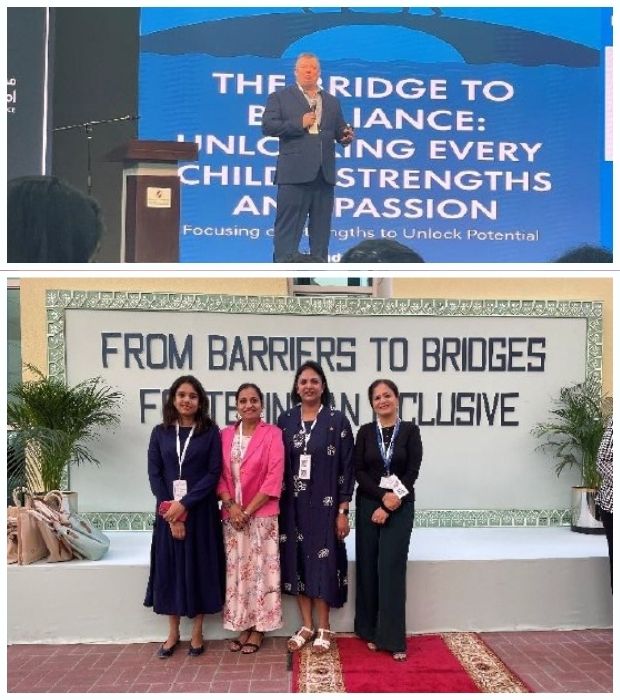
Inclusion Conference
Attendees: Ms Cinu (Head of Inclusion), Ms. Aparna (Special Educator), Ms. Sandhya Singh, and Ms. Mandeep (Teachers and G&T Champions)
Inclusion Conference was hosted by The Millennium School in celebration of their Silver Jubilee. Themed “From Barriers to Bridges: Fostering an Inclusive Culture,” the event brought together pioneers, educators, and inclusion advocates to explore practical and transformative approaches to inclusive education.
Keynote Address: Dr. Brad Johnson (Author and Transformational Leader in Education and Leadership)
The day opened with an inspiring keynote by Dr. Brad Johnson, who underscored the importance of relationship-driven teaching. He reminded that true learning flourishes in environments where learners feel connected and understood. His emphasis on unlocking divergent thinking in students reinforced the need to view each learner through a lens of potential, creativity, and individuality.
Panel Discussion: Moderator - Ms. Nargish Khambatta (Senior Vice-President – GEMS Education, CEO & Principal – GEMS Modern Academy)
A major highlight of the event was the panel discussion, moderated with great finesse by Ms. Nargish Khambatta, which brought together three diverse yet complementary perspectives:
Ms. Berna Bouwer (GEMS Corporate Head of Inclusion) advocated for a profound shift from a system of compliance to a culture of belonging, emphasizing that inclusive education is not about checking boxes but about ensuring every child feels truly accepted and valued.
Dr. Nadira, from the American University of Dubai, shed light on the growing concern of teacher burnout. She offered thoughtful strategies on how schools can create supportive systems that ensure the mental well-being of educators while maintaining high-quality inclusive practices.
Dr. Funke (GEMS corporate Head of Wellbeing), eloquently explored the intersection between inclusivity and well-being, asserting that inclusive schools are not just better for children with additional needs—they create healthier, happier environments for all students and staff.
Breakout Sessions: Practical Tools for Inclusion
1. IEPs in Action – Dhaval Mody (Vrudhi Educational and Technological Services Pvt Ltd, Maharashtra)
Dr. Mody introduced an innovative digital solution—an app called SPED, designed to streamline the development and tracking of Individualized Education Plans (IEPs). The app offers a practical approach to reducing documentation time, allowing educators to focus more on student engagement and instructional quality. His session emphasized turning IEPs from static documents into dynamic tools for real progress and personalized learning.
2. Collaborative Classrooms – Enhancing the Role of Classroom Support Adults in Inclusive Learning-Ms. Simi Joshi & Ms. Swati Dixit (Sanskriti School, Delhi)
In this session, Ms. Swati Dixit shared a compelling narrative of Sanskriti School’s transformation into a fully inclusive institution. She provided firsthand insights into the challenges faced and lessons learned during this transition. Particularly powerful was her discussion on the evolving role of classroom support adults, advocating for their integration not just as aides but as co-educators and vital contributors to inclusive teaching strategies.
3. Balancing Brilliance and Support- Meeting the Needs of Twice-Exceptional Students- Ms. Neelam Bhatti (Al Salam Community School Dubai)
The action research focused on students in the Foundation Stage, narrowing down to "twice-exceptional" children. Gifted students at the Secondary level were also monitored using internal and external data sources for progress and attainment. The research explored the identification of these students and provided interventions and strategies that best supported them in the classroom.
4. Caring for caregivers: Building Resilience in Inclusive Education Teams - Ms. Julie Keyes (Educational Consultant – The Educational Coach)
She emphasized the core objective of Coaching for Care, which is to empower educators and foster inclusive school communities. The session provided valuable insights into how coaching, when tailored specifically for the education sector, not only promotes self-care and well-being but also contributes to building strong, resilient school cultures.
It was highlighted that educators and school staff—who form the foundation of inclusive education—often extend support beyond what they receive. In the absence of resilient and well-supported teams, sustaining inclusive practices becomes increasingly difficult.
The session explored foundational well-being strategies with an emphasis on embedding coaching into daily school practices and broader institutional policies. She underscored the need for the intentional integration of coaching practices into school culture, creating a shared language and approach.
Furthermore, she explained how coaching can drive a shift in mindset—from a reactive, problem-solving approach to one that empowers individuals—and promote a leadership style rooted not just in empathy but in compassion. This transformative approach enables educators to thrive personally and professionally, ultimately enhancing the overall inclusivity and effectiveness of the school environment
This conference was a powerful reminder that inclusion is not a destination but an ongoing journey—one that requires collaboration, innovation, and a shared commitment to equity.























